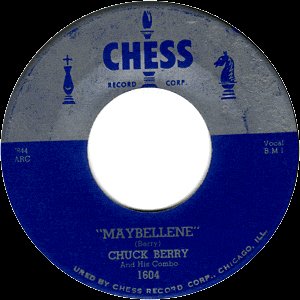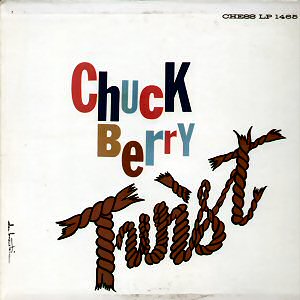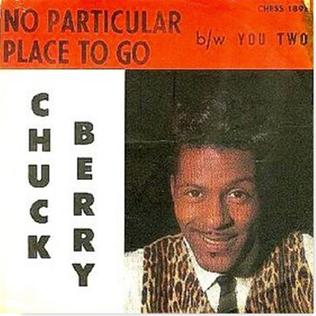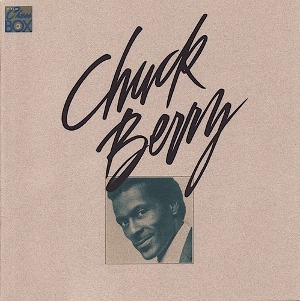Related Research Articles

"Roll Over Beethoven" is a 1956 hit song written by Chuck Berry, originally released on Chess Records single, with "Drifting Heart" as the B-side. The lyrics of the song mention rock and roll and the desire for rhythm and blues to be as respected as classical music. The title of the song is an imperative directed at the composer Ludwig van Beethoven to roll over out of the way and make room for the rock and roll music that Berry was promoting. The song has been covered by many other artists, including the Beatles and the Electric Light Orchestra. Rolling Stone magazine ranked it number 97 on its list of the "500 Greatest Songs of All Time".

"Maybellene" is a rock and roll song by American artist Chuck Berry, adapted in part from the Western swing fiddle tune "Ida Red". Released in 1955, Berry’s song tells the story of a hot rod race and a broken romance, the lyrics describing a man driving a V8 Ford and chasing his unfaithful girlfriend in her Cadillac Coupe DeVille. It was released in July 1955 as a single by Chess Records, of Chicago, Illinois. Berry's first hit, "Maybellene" is considered a pioneering rock and roll song. Rolling Stone magazine wrote of it, "Rock & roll guitar starts here." The record was an early instance of the complete rock and roll package: youthful subject matter; a small, guitar-driven combo; clear diction; and an atmosphere of unrelenting excitement.
"Run Rudolph Run" is a Christmas song written by Chuck Berry but credited to Johnny Marks and M. Brodie due to Marks' trademark on the character of Rudolph the Red-Nosed Reindeer. It was published by St. Nicholas Music (ASCAP) and was first recorded by Berry in 1958, released as a single on Chess Records.
"You Can't Catch Me" is a song written and recorded by Chuck Berry, released as a single in 1956.

After School Session is the debut studio album by rock and roll artist Chuck Berry, released in May 1957 by Chess Records. With the exception of two tracks, "Roly Poly" and "Berry Pickin'", all selections had been previously released on 45 rpm singles. It is the second long-playing album released by the Chess label.

One Dozen Berrys is the second studio album of Chuck Berry, released in March 1958 on Chess Records, catalogue LP 1432. With the exception of five new songs, "Rockin' at the Philharmonic," "Guitar Boogie," "In-Go," "How You've Changed," and "It Don't Take but a Few Minutes," and one alternate take, "Low Feeling", all tracks had been previously released on 45 rpm singles. It was also released in the United Kingdom. In 2012, Hoodoo reissued the album with Chuck Berry Is on Top on the same CD. Sheldon Recording Studio, where all of the recordings were made, was located at 2120 South Michigan Ave. in Chicago and eventually became Chess Studios.

Chuck Berry Is on Top is the third studio album by rock and roll artist Chuck Berry, released in July 1959 on Chess Records, catalogue LP 1435. With the exception of one track, "Blues for Hawaiians", all selections had been previously released on 45 rpm singles, several of which were double-sided and charted twice. In his review of the album for AllMusic, Cub Koda described it as "almost a mini-greatest-hits package in and of itself" and the most perfectly realized collection of Berry's career. In 2008, Mobile Fidelity Sound Lab reissued the album with St. Louis to Liverpool on an Ultradisc II Gold compact disc. In 2012, Hoodoo reissued the album with One Dozen Berrys on the same CD.

Chuck Berry Twist is the first compilation album by Chuck Berry, released by Chess Records in February 1962, during Berry's imprisonment. The title was an attempt to capitalize on a new dance craze, the Twist, introduced by Chubby Checker in 1960, even though none of the songs musically conformed to the Twist style. The album was reissued a year later with a new title, More Chuck Berry. An album with that title was released in the UK by Pye International Records in 1964, featuring the same cover but a completely different track listing.
"School Days" is a rock-and-roll song written and recorded by Chuck Berry and released by Chess Records as a single in March 1957 and on the LP After School Session two months later. It is one of his best-known songs and is often considered a rock-and-roll anthem.
"Too Much Monkey Business" is a song written and recorded by Chuck Berry, released by Chess Records in September 1956 as his fifth single. It was also released as the third track on his first solo LP, After School Session, in May 1957; and as an EP. The single reached number four on Billboard magazine's Most Played In Juke Boxes chart, number 11 on the Most Played by Jockeys chart and number seven on the Top Sellers in Stores chart in 1956.

"No Particular Place to Go" is a song by Chuck Berry, released as a single by Chess Records in May 1964 and released on the album St. Louis to Liverpool in November 1964.
"Brown Eyed Handsome Man" is a rock and roll song written and recorded by Chuck Berry, originally released by Chess Records in September 1956 as the B-side of "Too Much Monkey Business." It was also included on Berry's 1957 debut album, After School Session. The song title was also used as the title of a biography of Berry.

"Nadine " is a song written and recorded by Chuck Berry. It was released as a single in February 1964 and was the first music that Berry released after finishing a prison term in October 1963.

American rock and roll musician Chuck Berry's discography includes 20 studio albums, 12 live albums, 31 compilation albums, 50 singles, 8 EPs, and 2 soundtrack albums.

The Chess Box is a compact disc box set compilation by Chuck Berry. It is one in a series of box sets issued by MCA/Chess in the late 1980s. The Chuck Berry set is the most prominent of these, having won a Grammy Award for Best Historical Album in 1989. Berry's Chess Box was reissued on vinyl in 1990.
"Gotta Find My Baby" is a rock and roll song written and recorded in 1941 by Peter Joe Clayton under the name "Doctor Clayton." In the 1950s, cover versions of the were recorded as "I Got To Find My Baby" by other Rhythm & Blues artists, including B.B. King (1952), Little Walter (1954) and Chuck Berry, who is sometimes miscredited as the song's composer. The song was also covered by The Beatles in 1963.
"Wee Wee Hours" is a song written and recorded by Chuck Berry in 1955. Originally released as the B-side of his first single, "Maybellene", it went on to become a hit, reaching number 10 in the Billboard R&B chart.
Down Bound Train is a song written by Chuck Berry. It was inspired by Berry's "fire and brimstone" religious upbringing. Both of his parents were staunch Baptists and sang in the Antioch Church Choir, which rehearsed at his home.
"Thirty Days ", also written "30 Days", is a 1955 song and chart single by Chuck Berry. Berry wrote "30 Days" to pay tribute to Hank Williams' country music.

"Reelin' and Rockin'" is a song written and recorded by Chuck Berry. It was originally recorded in 1957 and released as the B-side of "Sweet Little Sixteen".
References
- 1 2 "45cat - Chuck Berry - No Money Down / The Downbound Train - Chess - USA - 1615". 45cat. Retrieved 2017-05-27.
- 1 2 Rudolph, Dietmar. "A Collector's Guide to the Music of Chuck Berry: The Chess Era (1955–1966)" . Retrieved 2009-09-03.
- ↑ "The Chuck Berry Database Details For Recording Session: 20. 12. 1955". A Collector's Guide to the Music of Chuck Berry. Dietmar Rudolph. Retrieved 28 September 2021.
- 1 2 "Chuck Berry – No Money Down". Broaden Your Horizons — News, Info and Reviews About Rock Legends. 2010-03-07. Retrieved 2017-05-27.
- ↑ Collins, Thomas (August 2015). "Chuck Berry — Not So Much a Poet as a Storyteller". Perfect Sound Forever. Retrieved 2017-05-27.